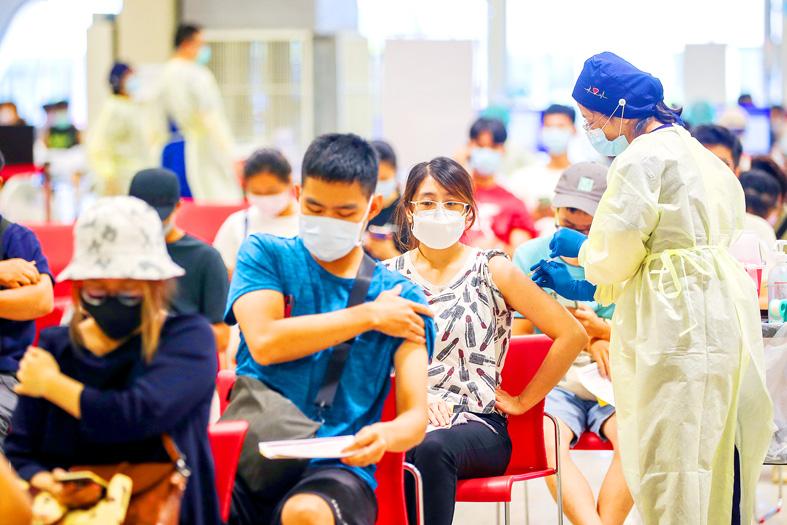Taiwan should abandon its “COVID zero” strategy and instead focus on COVID-19 vaccines and improving clinical outcomes, a Taiwanese medical expert said yesterday, citing Singapore’s experience in battling the pandemic.
Huang Yun-ru (黃韻如), a professor of medicine at National Taiwan University who lives in Singapore, made the remarks in an online news conference organized by the National Taiwan University Hospital.
As vaccines are effective in preventing deaths, severe symptoms and hospitalizations, it is possible to live with COVID-19 if a large percentage of the population is fully vaccinated, she said.

Photo: CNA
Singapore has vaccinated 80 percent of its people against COVID-19, the highest vaccination rate in the world, Huang said, adding that Taiwan’s top priority should be raising its inoculation rate.
An indefinite border closure cannot be sustained in Singapore, which depends on imports for 90 percent of its food, and needs Changi Airport to stay open so that the city-state can remain a regional hub, she said.
Singapore attained such a high vaccination rate because its government created a precisely calculated vaccine acquisition program in April last year and began distributing vaccines in December, Huang said.
Although people older than 70 were given top priority for COVID-19 vaccination, the age group had the lowest inoculation rate in the city-state, she said, adding for example that 90 percent of Singaporean youths were fully vaccinated, despite their lower priority.
Singapore launched a campaign to persuade elderly vaccine holdouts following the outbreak of the Delta variant of SARS-CoV-2, which caused deaths and hospitalizations overwhelmingly in that demographic, Huang said.
The measures included sending medical volunteers to communities to inoculate people and carry out public awareness campaigns, which appeared to have increased vaccination rates among elderly people over the past two months, she said.
The city-state uses the Pfizer-BioNTech and Moderna COVID-19 vaccines for its publicly subsidized vaccination program, but other vaccines are available for self-paid vaccination for people who do not trust messenger RNA-based vaccines, she said.
Last month, Singapore unveiled an App-based vaccine passport for visiting public places, Huang said.
Taiwan has not adopted similar measures due to its low vaccination rate and legal concerns over digital privacy, she said.
Digital vaccine passports do not necessarily infringe of human rights and Singapore has shown that they are a useful incentive for people to get vaccinated, she added.

The High Prosecutors’ Office yesterday withdrew an appeal against the acquittal of a former bank manager 22 years after his death, marking Taiwan’s first instance of prosecutors rendering posthumous justice to a wrongfully convicted defendant. Chu Ching-en (諸慶恩) — formerly a manager at the Taipei branch of BNP Paribas — was in 1999 accused by Weng Mao-chung (翁茂鍾), then-president of Chia Her Industrial Co, of forging a request for a fixed deposit of US$10 million by I-Hwa Industrial Co, a subsidiary of Chia Her, which was used as collateral. Chu was ruled not guilty in the first trial, but was found guilty

‘DENIAL DEFENSE’: The US would increase its military presence with uncrewed ships, and submarines, while boosting defense in the Indo-Pacific, a Pete Hegseth memo said The US is reorienting its military strategy to focus primarily on deterring a potential Chinese invasion of Taiwan, a memo signed by US Secretary of Defense Pete Hegseth showed. The memo also called on Taiwan to increase its defense spending. The document, known as the “Interim National Defense Strategic Guidance,” was distributed this month and detailed the national defense plans of US President Donald Trump’s administration, an article in the Washington Post said on Saturday. It outlines how the US can prepare for a potential war with China and defend itself from threats in the “near abroad,” including Greenland and the Panama

DEADLOCK: As the commission is unable to forum a quorum to review license renewal applications, the channel operators are not at fault and can air past their license date The National Communications Commission (NCC) yesterday said that the Public Television Service (PTS) and 36 other television and radio broadcasters could continue airing, despite the commission’s inability to meet a quorum to review their license renewal applications. The licenses of PTS and the other channels are set to expire between this month and June. The National Communications Commission Organization Act (國家通訊傳播委員會組織法) stipulates that the commission must meet the mandated quorum of four to hold a valid meeting. The seven-member commission currently has only three commissioners. “We have informed the channel operators of the progress we have made in reviewing their license renewal applications, and

A wild live dugong was found in Taiwan for the first time in 88 years, after it was accidentally caught by a fisher’s net on Tuesday in Yilan County’s Fenniaolin (粉鳥林). This is the first sighting of the species in Taiwan since 1937, having already been considered “extinct” in the country and considered as “vulnerable” by the International Union for Conservation of Nature. A fisher surnamed Chen (陳) went to Fenniaolin to collect the fish in his netting, but instead caught a 3m long, 500kg dugong. The fisher released the animal back into the wild, not realizing it was an endangered species at